Israel’s former national security adviser charged that Palestinian Authority President Mahmoud Abbas’s failure to fight terrorism was a deliberate and risky gamble, but argued that Israel should not let the weekend terror attacks dictate the agenda of US Secretary of State Antony Blinken’s visit this week.
“It’s a dangerous game,” Meir Ben-Shabbat, Prime Minister Benjamin Netanyahu’s top security aide from 2017 to 2021, told The Times of Israel on Sunday. “If it’s intended as a lever to pressure Israel, it’s dangerous for Abu Mazen [Abbas’s nom de guerre] first and foremost.”
On Friday night, a Palestinian gunman from East Jerusalem killed seven people and injured three more in the Neve Yaakov neighborhood of Jerusalem, and the next morning, a 13-year-old Palestinian shot and wounded two Israeli men near the Old City.
Ben-Shabbat said that if Abbas does not fight Palestinian terrorism more forcefully, the IDF could be forced to embark on a major military operation in the West Bank, as it did in 2002 at the height of the Second Intifada.
“Abu Mazen remembers well the days of Operation Defensive Shield,” said Ben-Shabbat. “He doesn’t want to get there, but it will get there. Israel’s security services have a primary responsibility to protect Israeli lives. If we get to a situation where we need to do that, we will.”
“Terror can’t be a lever to pressure Israel,” he said. “If we give them [the PA] what they want, they’ll fight terror; if not, they’ll leave us to deal with terrorism — [that line of thinking is] a total mistake. That cannot be in the PA’s toolbox.”
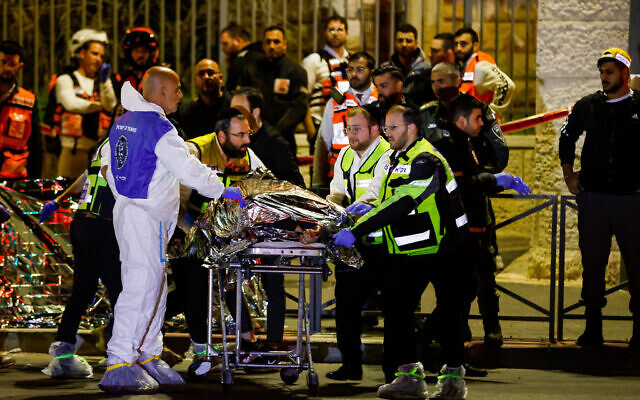
Security and rescue forces at the scene of a deadly terror shooting attack in Neve Yaakov, Jerusalem, January 27, 2023 (Olivier Fitoussi/Flash90)
The PA chief announced that he was suspending security cooperation with Israel the day before the Neve Yaakov attack, in the wake of an IDF raid in Jenin refugee camp in which 10 Palestinians — most but not all of them gunmen — were killed. The IDF said Thursday’s operation was necessary to foil imminent attack plans by a local Islamic Jihad terror cell. The group had primed explosives and firearms, according to the IDF.
Ben-Shabbat, now a visiting senior research fellow at the Institute for National Security Studies at Tel Aviv University, said that while the PA is not actively supporting terrorism, it is failing to combat it.
“The PA simply doesn’t do its part,” he said. “It doesn’t want to be in conflict with anyone, so it lets the thugs in Nablus establish the Lion’s Den terror group, it lets the thugs in Jenin store weapons and take over the refugee camp.
“And it leaves Israel to deal with the results.”
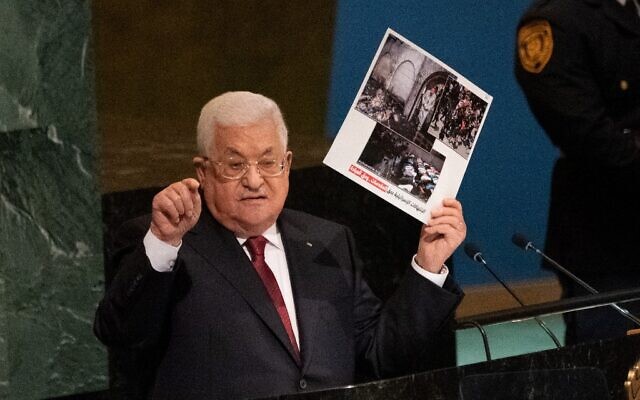
Palestinian Authority President Mahmoud Abbas holds up a graphic as he addresses the 77th session of the United Nations General Assembly at UN headquarters in New York on September 23, 2022 (Bryan R. Smith / AFP)
If the PA won’t fight terror, the former Shin Bet official said, it is not clear why the organization should exist.
“You [the PA] received permission to be here in the Oslo Process,” Ben-Shabbat said. “You came here with enough people, you received weapons, you received responsibility. We always hear this statement that ‘the PA can’t. It can’t in Gaza, it can’t in Jenin, it can’t in Nablus.’ If you can’t, then what are you doing here?”
Tensions have soared in the West Bank in recent months as the IDF has pressed on with an anti-terror offensive mostly focused on the northern West Bank to deal with a series of attacks that left 31 people in Israel dead in 2022.
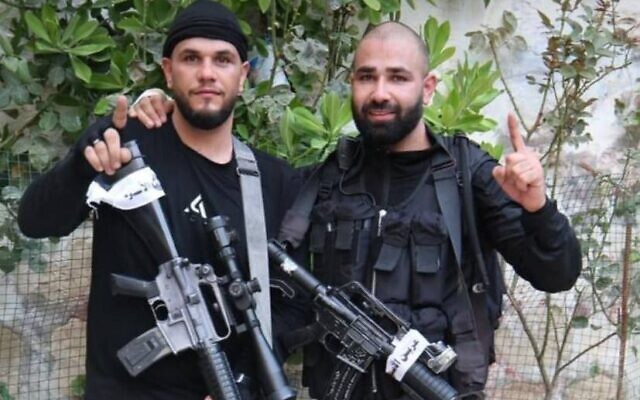
Farouk Salameh (right) is seen with Wadee al-Houh (left) the former leader of the Nablus-based Lion’s Den. Salameh was killed in an Israeli raid in Jenin on Novemer 3, 2022, and al-Houh was killed in an similar raid in Nablus on October 25, 2022. (Social media)
“This whole episode begins in Jenin,” said Ben-Shabbat. “Why does Israel go into Jenin? Because the PA doesn’t do its job.”
Road map against Iran
Blinken’s visit to Israel on Monday and Tuesday is sure to focus at least in part on the attacks. But Ben-Shabbat emphasized that Israel must not let conversations with America’s top diplomat center around Palestinian terrorism.
“It would be a mistake to allow the Palestinian issue to take over the agenda of the visit,” he said. “Israel’s approach must be to portray the Palestinians issue as secondary during Blinken’s visit.”
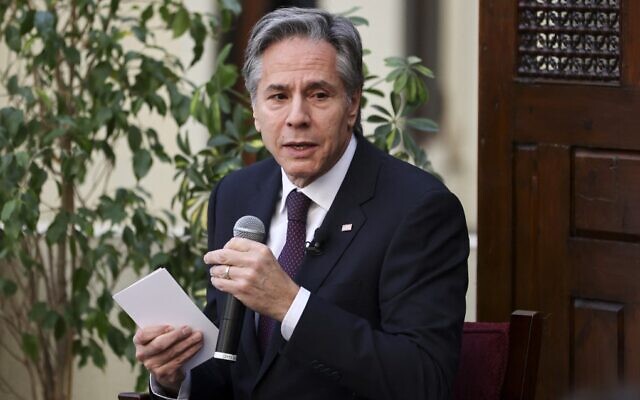
US Secretary of State Antony Blinken visits the American University in the Egyptian capital Cairo, on Januray 29, 2023. (Mohamed Abd El Ghany/ Pool/ AFP)
Blinken will meet with Netanyahu and Palestinian Authority President Mahmoud Abbas separately, and call “broadly for steps to be taken to de-escalate tensions,” US State Department spokesman Vedant Patel told reporters.
Ben-Shabbat laid out three reasons to keep the Palestinian issue from dominating the visit.
“First, not to let Palestinian terror get the feeling that it dictates the diplomatic agenda,” he explained. “Two, the Americans’ ability to change things among the Palestinians is relatively limited. The key here is not in the Americans’ hands, and Washington’s involvement here is primarily pressure on Israel.”
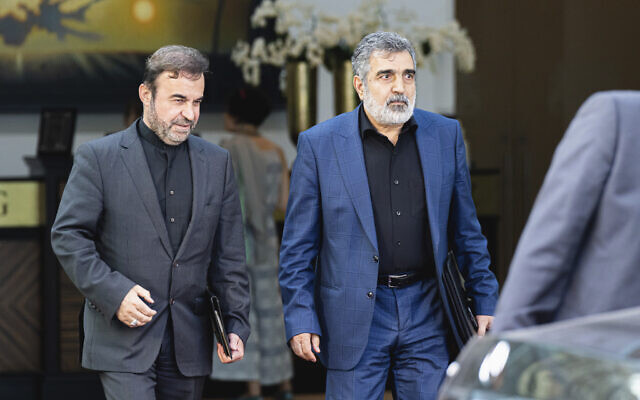
Iranian deputy foreign minister Reza Najafi, left, and Iranian AEOI spokesperson Behrouz Kamalvandi, seen leaving the Palais Coburg where closed-door nuclear talks took place in Vienna, Austria, August 5, 2022. (AP/Florian Schroetter)
“Three, and this is most important reason in my eyes, the main threat for Israel and the region is Iran. And America is extremely relevant here, it is the key player.”
Israel and the US should focus on reaching an agreement on a road map against Iran, he said.
With talks between Tehran and the P5+1 on a return to the 2015 nuclear deal stalled, and chances for a deal waning by the day, Ben-Shabbat urged Israel to seek a declaration by the US and European powers that the deal is dead and that they would be referring the Iran nuclear issue to the UN Security Council in keeping with the JCPOA’s “snapback” mechanism.
He also called for increased sanctions on Tehran’s oil exports, oversight of its dual-use imports, and increased diplomatic isolation of Iran.
During Blinken’s visit, Ben-Shabbat said, Israel should seek to come to an agreement on new steps to delay progress in Iran’s nuclear program, and to come to further understandings on a military option against the Islamic Republic.
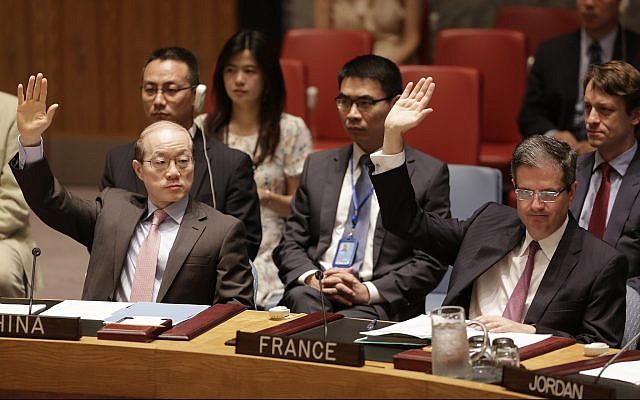
China’s United Nations Ambassador Liu Jieyi, left, and French Ambassador Francois Delattre vote in favor of a Security Council resolution approving Iran’s nuclear deal at United Nations headquarters, July 20, 2015. (AP /Mark Lennihan)
If Netanyahu does reach agreements with Blinken on Iran, he argued, it opens the door for significant progress on Israel’s ties with Saudi Arabia and other Gulf Arab states.
“Agreeing on a road map paves the way for healing the fracture between Washington and Riyadh,” he said, “to weaken the growing connections between the Gulf states and Russia and China, and to move forward on initiatives to help handle the energy crisis, and the global food crisis.”
The United States has historically taken a lead in Middle East diplomacy.
Blinken’s visit is part of an effort by the Biden administration to engage quickly with Netanyahu, who returned to office in late December leading the most right-wing government in Israel’s history.
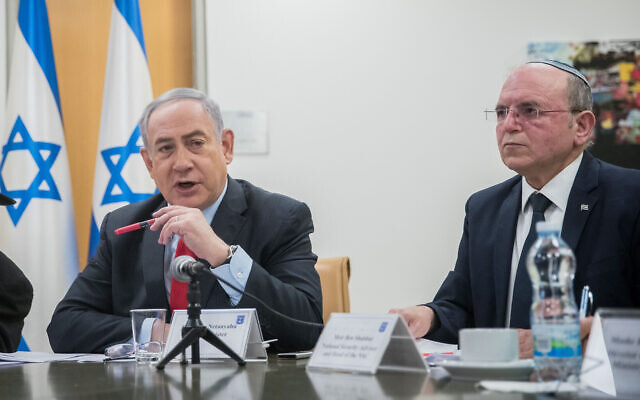
File: Israeli Prime Minister Benjamin Netanyahu and National Security Adviser Meir Ben-Shabbat hold a video conference at the Foreign Ministry in Jerusalem, on March 9, 2020. (Yonatan Sindel/Flash90)
Israel’s longest-serving prime minister had a fraught relationship with the last Democratic president, Barack Obama, as Netanyahu openly sided with his Republican adversaries against US diplomacy with Iran.
Biden’s national security adviser, Jake Sullivan, visited earlier in January to discuss Iran after Biden’s efforts to restore the 2015 nuclear accord — strongly opposed by Netanyahu — effectively died.
Decades from Defensive Shield
Ben-Shabbat, who spent decades combating Palestinian terrorism emanating from Gaza, said that he does not see the recent attacks as a reaction to Netanyahu’s return to power or to his right-wing allies.
The main context for the overall rise in violence, he argued, was the fact that Operation Defensive Shield, which devastated the Palestinian economy as IDF forces retook West Bank cities to stop a series of ghastly suicide bombings, is now 21 years in the past.
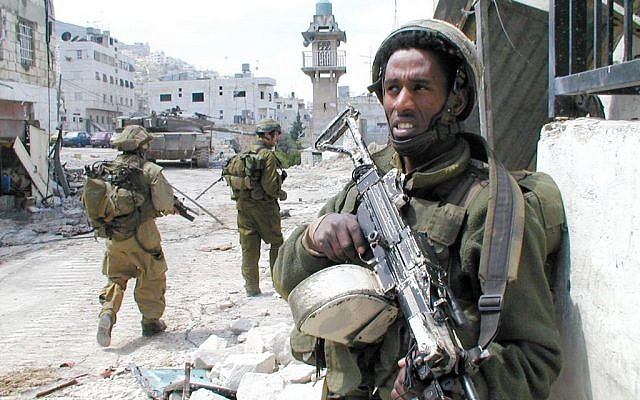
An IDF soldier stands guard in Nablus during Operation Defensive Shield in 2002. (IDF Spokeserson’s Unit/Flickr)
“The [Palestinian] public that experienced Operation Defensive Shield really does not want to go back to those days,” Ben-Shabbat said. “But the youth knows those experiences less.”
He also pointed at social media as a way for Palestinian attackers to be glorified, and for young Palestinians to be radicalized: “It might be a small number of attackers, but they have a wide circle of supporters. And this is connected to the atmosphere that comes from Abu Mazen. If you give incentives to attackers, you encourage the population, and turn them into society’s heroes.”
“We have to apply serious pressure on the Palestinian Authority around everything that has to do with creating a different atmosphere,” he continued.
Ben-Shabbat said his former boss’s response to the weekend’s attacks has been appropriate.
“In general I think that his reaction is responsible, rational, extremely thought out, and offers an answer for this reality,” he said. “The challenge is not a simple one, since we are talking about diffused terrorism…. The challenge is primarily one for the security services. In these circumstances, I think the prime minister’s policies are extremely responsible.”
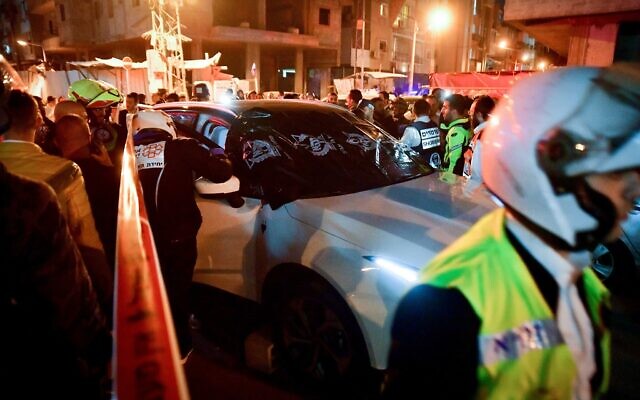
Israeli police officers and medics are seen at the scene of a deadly terrorist attack in Bnei Brak, March 29, 2022. (Avshalom Sassoni/Flash90)
Though stopping “lone wolf” terrorists is a major challenge, Ben-Shabbat argued that Israel can meaningfully reduce the number of attacks. Ideally, intelligence would allow security forces to catch would-be terrorists before they set out.
“If not that, then the most effective reaction is at the time of the attack,” he continued. “The more terrorist attempts end with the attacker being neutralized without any casualties on our side, the more they will understand that they are going to die for no reason.”
Having more licensed gun carriers in Israel, as Netanyahu is advocating, would contribute to that effort, he argued.
Israel also has the ability to reduce the glorification of attackers: “Oftentimes, Israel’s security services have information on the personal circumstances of the attacker. Unrequited love, social isolation, familial conflict. And often they avoid publicizing because it seems unethical.”
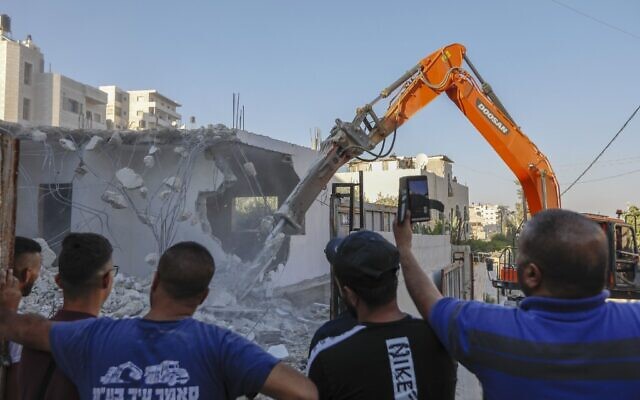
Relatives of the Shalalda family watch as an excavator hired by them demolishes their family home in Al-Tur in east Jerusalem on July 2, 2020 (AHMAD GHARABLI / AFP)
Ben-Shabbat added that the series of steps agreed upon by the security cabinet on Saturday night would be effective.
“It”s important to destroy the homes of attackers quickly,” he said. “It is a deterrent. I can say from my own experience that there are many cases of people we arrested who admitted to us they planned to carry out attacks, and we asked why they didn’t carry them out. The thing that stood in their path was the implications for their families.”
The security cabinet decided to immediately seal off the house of the terrorist who carried out Friday’s attack, Alqam Khayri, in East Jerusalem’s A-Tur neighborhood, ahead of its demolition.
The ministers also elected to cancel National Insurance Institute and other benefits for the family members of terrorists who support their actions.
“Anyone who carries out an attack not only loses the roof over his head and family,” said Ben-Shabbat, “but also his bread and his economic well-being. “
“It’s about creating a different consciousness,” Ben-Shabbat said.